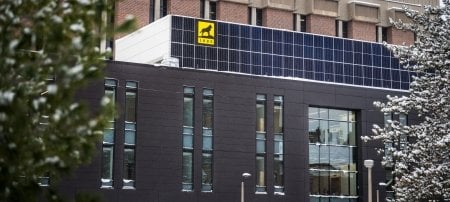Michigan Tech President Reports Cost-Cutting Steps, Protests MPSERS Charges
Michigan Technological University, like six other public universities in Michigan, must pay a whopping bill each year to a state retirement system in which employees hired since 1996 have not participated and cannot participate. And the amount the University must pay is growing every year. Last year it totaled more than 14 percent of the state appropriation that Michigan Tech received.
The Michigan Public School Employees Retirement System (MPSERS) cost Michigan Tech $5.75 million last year, although the University opted out of MPSERS in 1996, and no employee hired since then has had the option to join that retirement system.
“We are required to pay for employees who would have been in MPSERS, even though they could not join, have not joined and will never receive a dime in benefits from the program,” said Michigan Tech President Glenn D. Mroz, testifying before the House Appropriations Committee Higher Education Subcommittee in Lansing today.
Over the past decade, state appropriations to Michigan Tech have dropped 24 percent, while the cost to students of higher education—particularly in the sciences, technology and engineering—has skyrocketed. The fiscal pain is compounded by having to return nearly $6 million of a shrinking state appropriation to meet the University’s MPSRS requirement, Mroz said.
Last year, Tech and the other MPSERS universities thought the Legislature had solved the problem by amending the law, capping part of the MPSERS payments. But the Office of Retirement Services chose not to apply the cap to the MPSERS universities.
“If Michigan Tech were treated the same as K-12 districts and community colleges, the University would save $3.6 million,” Mroz said. “We need legislative clarification of the act regarding MPSERS payments. We're asking you to level the playing field in controlling costs by treating the MPSERS 7 like the other 900 groups in the MPSERS system."
President Mroz went on to talk about the cost of higher education and the amount of state support provided.
“There is a direct correlation between the amount of state funding for public universities and the rate of tuition that must be charged,” he stated. He also pointed out that technically skilled science and engineering graduates are in great demand by employers, with 94 percent of Michigan Tech’s graduates finding jobs within six months of graduation. Such university graduates are the key to prosperity for Michigan and the nation, he said.
“We have made numerous efforts to ensure that we can continue to provide Michigan’s exceptional and deserving students the best education at the most affordable cost,” Mroz told the subcommittee. He outlined a number of successful cost-cutting and fiscal measures that Michigan Tech has undertaken, including
- Increasing financial aid by 250 percent over the past eight years
- More than doubling research expenditures, to more than $70 million
- Raising $200 million in an intensive capital campaign, mostly to support scholarships, endowed chairs and professorships, academic programs and research
- Reorganization of facilities management operations, reducing its budget by nearly $1 million
- Consolidation of information technology
- Applying LEAN principles to make processes more efficient and eliminate waste, enabling Tech to redirect $2 million to other pressing needs
- Changing health care vendors, saving an estimated $2 million this year
“We urge you to help us make a university education affordable for Michigan students and their families,” Mroz concluded.
Michigan Technological University is a public research university founded in 1885 in Houghton, Michigan, and is home to nearly 7,500 students from more than 60 countries around the world. Consistently ranked among the best universities in the country for return on investment, Michigan’s flagship technological university offers more than 120 undergraduate and graduate degree programs in science and technology, engineering, computing, forestry, business, health professions, humanities, mathematics, social sciences, and the arts. The rural campus is situated just miles from Lake Superior in Michigan's Upper Peninsula, offering year-round opportunities for outdoor adventure.




Comments